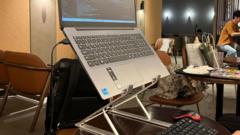The bustling cafes of South Korea are facing a growing challenge due to a cultural trend known as 'Cagongjok', where students and young workers occupy spaces for extended periods, often setting up elaborate workstations. In affluent districts like Daechi, cafe owner Hyun Sung-joo voiced his frustrations with customers bringing in multiple electronics—such as two laptops and power strips—while staking claim to tables for entire days. This growing phenomenon has prompted Starbucks Korea to introduce guidelines aimed at curbing excessive occupation of space, balancing the needs of 'Cagongjok' enthusiasts with those seeking a more social coffee shop experience.
On a typical evening in Gangnam, students fill Starbucks branches, some studying for exams and others engaged in quiet work. While the new Starbucks guidelines aim to address the issues caused by a minority creating disruptions, many customers feel the presence of long-term occupants decreases their ability to enjoy the cafes as social spaces. Recent surveys indicate that approximately 70% of Gen Z job seekers in South Korea visit cafes at least once a week for study purposes, reflecting a shift in how cafes are perceived compared to Western counterparts.
Responses to Starbucks' updated rules have been mixed. While some commend the initiative for restoring balance, other customers criticize it as overreach, arguing that it deviates from the brand's historically relaxed policies. This mixed feedback is mirrored in independent cafes, where some owners have taken strict measures to protect their business, such as implementing maximum time limits for studying. After observing customers monopolizing space, one cafe in Jeonju introduced a "No Study Zone" sign, clarifying the intended use of their space.
The appeal of studying in cafes rather than libraries or homes varies among individuals. For many, such as Yu-jin Mo, cafes represent a comforting alternative to potentially stifling or unsafe environments. A professor studying lifelong education notes that 'Cagongjok' is largely a product of South Korean society's competitive pressures, highlighting the need for more inclusive spaces for students and young workers. She emphasizes the importance of establishing guidelines that allow for productive study without inconveniencing others, aiming for a harmonious coexistence that respects both study needs and social spaces.
On a typical evening in Gangnam, students fill Starbucks branches, some studying for exams and others engaged in quiet work. While the new Starbucks guidelines aim to address the issues caused by a minority creating disruptions, many customers feel the presence of long-term occupants decreases their ability to enjoy the cafes as social spaces. Recent surveys indicate that approximately 70% of Gen Z job seekers in South Korea visit cafes at least once a week for study purposes, reflecting a shift in how cafes are perceived compared to Western counterparts.
Responses to Starbucks' updated rules have been mixed. While some commend the initiative for restoring balance, other customers criticize it as overreach, arguing that it deviates from the brand's historically relaxed policies. This mixed feedback is mirrored in independent cafes, where some owners have taken strict measures to protect their business, such as implementing maximum time limits for studying. After observing customers monopolizing space, one cafe in Jeonju introduced a "No Study Zone" sign, clarifying the intended use of their space.
The appeal of studying in cafes rather than libraries or homes varies among individuals. For many, such as Yu-jin Mo, cafes represent a comforting alternative to potentially stifling or unsafe environments. A professor studying lifelong education notes that 'Cagongjok' is largely a product of South Korean society's competitive pressures, highlighting the need for more inclusive spaces for students and young workers. She emphasizes the importance of establishing guidelines that allow for productive study without inconveniencing others, aiming for a harmonious coexistence that respects both study needs and social spaces.



















